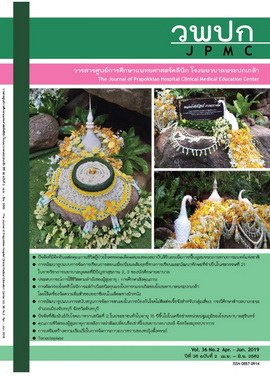The Development of a Self-Management Support Model for Non-Communicable Disease Prevention among People at Risk of Chronic Illness: Bangkaja, Muang District, Chanthaburi Province
Main Article Content
Abstract
Background: The people at risk of non-communicable diseases are likely to develop the disease within a short period of time if they do not change their inappropriate behaviors. Therefore, the development of a self-management support model to prevent the diseases is necessary.
Objective: To develop a self-management support model to prevent non-communicable diseases for at-risk groups and evaluating the effectiveness of the model.
Materials and methods: This study is research and development. The sample group comprised 45 people at risk of diabetes and/or hypertension at Bangkaja Health Promoting Hospital, Muang District, Chanthaburi Province. They were selected using purposive sampling based on the research criteria. The research was conducted during February-August 2018. The research instruments were composed of a self-management in disease prevention questionnaire, medical equipment for lipid profile and blood sugar investigation, a sphygmomanometer, a stadiometer, and a tape measure used in testing for psychometric and biometric properties. Data were analyzed using descriptive statistics: Repeated Measure ANOVA, Bonferroni, Paired t-test, Wilcoxon signed rank test. The qualitative data were analyzed using constant comparative study and were tested using triangulation techniques.
Results: The development of a self-management support model for non-communicable disease prevention among people at risk in this study consisted of four processes including: 1) Exploring the lifestyle, problems and health risk behaviors of people in at-risk groups; 2) Collaborative goal setting and health behavior modification planning to decrease risks; 3) Self-management training of disease prevention and self-regulation to attain the goals, and 4) Reflecting on the practice and rethinking the new methods to attain the goals. The model evaluation at 3 months revealed that the mean scores of self-management behaviors for disease prevention were statistically higher than the baseline (p = 0.031), the fasting blood sugar and systolic blood pressure were statistically lower than the baseline (p = 0.016, and p = 0.002, respectively), whereas the diastolic pressure, waist circumference, and body mass index were not statistically different (p = 0.286, p = 0.077, and p = 0.500, respectively). At 6 months, the results revealed that the mean score of self-management behaviors was statistically significantly higher than the baseline (p = 0.007). In addition, the fasting blood sugar, systolic blood pressure, waist circumference, body mass index, and cardiovascular disease risk were statistically lower than the baseline (p = 0.048, p < 0.001, p = 0.009, p = 0.016, and p < 0.001, respectively), whereas the diastolic blood pressure was lower than the baseline without statistical significance (p = 0.500).
Conclusion: The results suggest that the model in this study can be used for promoting behavior change among people at risk of chronic illness in the community in order to prevent or reduce the risk of chronic illness. In addition, self-regulated stimulation is needed for maintaining the behavior changes.
Article Details
References
Ministry of Public Health, Department of Disease Control. Annual Report 2015. Bangkok: Bureau of Non Communicable Diseases; 2015.
Munden J. Diabetes mellitus; a guide to patient care. Philadelphai: Lippincott Williams & Wilkins, 2007.
NCDs are a huge economic burden costing the Thai society, and are the predominant killers in Thailand. [Internet] 2018 [updated 2018 Feb 9; cited 2019 March 14 ]. Available from: https://moneyhub.in.th/article/ncds
World Health Organization. Diet, nutrition, and the prevention of chronic diseases. Geneva: World Health Organization; 2003.
Non-communicable disease prevention and control project under the country's cooperationstrategy between the Thai government and the World Health Organization: Executive summary. [Internet] 2016. [cited 2016 April 23]. Available from: https://www.searo.who.int/thailand/areas/ccs-ncd-proposal-thai.pdf (In THAI)
Ministry of Public Health, Department of Disease Control. Annual Report 2015. Nonthaburi: Bureau of Epidemiology, 2015.
Ministry of Public Health, Department of Disease Control. Annual Report 2017. Nonthaburi: Bureau of Epidemiology, 2016.
Glasgow RE, Funnell MM, Bonomi AE, Davis C, Beckham V, Wagner EH. Self-management aspects of the improving chronic illness care breakthrough series: implementation with diabetes and heart failure teams. Ann Behav Med 2002 ;24 : 80-7.
Whitlock EP, Orleans CT, Pender N, Allan J. Evaluating primary care behavioral counseling interventions: An evidence-based approach . Am J Prev Med 2002; 22: 267-84.
Zimbudzi E, Lo C, Misso ML, Ranasinha S, Kerr PG, Teede HJ, et al. Effectiveness of self-management support interventions for people with comorbid diabetes and chronic kidney disease: a systematic review and meta-analysis. Syst Rev 2018;7:84.
Reed RL, Roeger L, Howard S, Oliver-Baxter JM, Battersby MW, Bond M, et al. A self-management support program for older Australians with multiple chronic conditions: a randomised controlled trial. Med J Aust 2018; 208: 69-74.
Thonghong A, Thepsittha K, Jongpiriyaanun P. Chronic diseases surveillance report, 2012. WESR, Thailand 2013; 44:801-15.
Vasuthada C, Dechavoot L, Jaikla N, Jaruji S. The Rationship between perception toward non-communicable diseases and health promotion behaviors for non-communicable diseases prevention among people in muang district Chanthaburi province. Chanthaburi: Phrapokklao Nursing College; 2017.
Ningsanond N. Hungsaphuk K. Maneevej: new paradigm in healthcare. Songkhla: Neopoint Co,Ltd; 2018.
Kantara S, Teriymchasri S. Meditation for health healing. 5th ed. Bangkok: Samcharoen panich Co., Ltd, 2007.
Sukdee S, Intarakamhaeng U, Duangchan P. The development of health behavior modification model in non-communicable chronic diseases risk by using participatory approach in knowledge management of the community in tambon Bangklua, Chachoengsao province. Journal of Health Education. 2017; 40(1): 38-52.
Tesana N, Jaipakdee J, Prompukdee B, Pinijluek K. Development model of the type 2 diabetes mellitus prevention in high risk group. Bangkok: Health System Research Institute; 2015.

